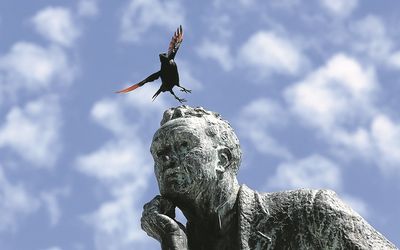AS A former Rhodes scholar who studied at Oxford University, I have been particularly intrigued by the student agitation at the University of Cape Town (UCT) to remove the statue of the greatest imperialist of the 19th century: Cecil Rhodes.
I have always justified my acceptance of the scholarship as a pragmatic decision to take a slice of the wealth plundered from Africa to pursue anti-colonial causes in order to bite the hand that fed me.
The spark that lit the fuse of protest at UCT was provided by a student, Chumani Maxwele, who threw human excrement on Rhodes’s statue. Other students followed by throwing urine and pig manure at the monument. Yet more students covered the statue with a white cloth, as if to hide the imperial stain. A photographer was assaulted by campus security.
Rhodes University — also named after the colonial plunderer — removed a statue of Rhodes from its main entrance 20 years ago as SA entered the democratic era. Why has it taken so long for a debate to emerge at UCT on Rhodes’s legacy?
Listening to the students, the removal of the statue appeared to be a metaphorical call for the transformation of the university’s curriculum, culture and faculty, which many blacks feel are alienating and still reflect a Eurocentric heritage.
Maxwele noted that he had acted on behalf of the collective pain and suffering of all black people against what he described as the "colonial dominance" still evident at UCT. He argued that black students would not want to graduate in a hall named after the imperialist, Leander Jameson, wondering "where are our heroes and ancestors?" The university’s Student Representative Council supported calls for the removal of the statue, describing the events as a "consequence of an institutional culture that is largely exclusionary".
It noted that "for too long the narrative at the university has silenced the voices of black students and black history", and asked "how can a coloniser donate land that was never his land in the first place?"
Another student, Rekgotsofetse Chikane, wrote an open letter to the chairman of the university council, Archbishop Njongonkulu Ndungane, noting that he found his "silence on matters of transformation at UCT … disconcerting", and observing that UCT students often played a game of asking whether they had ever been lectured by a black academic, and citing a common saying among students that the university was "a European university stuck at the bottom of Africa".
Mahmood Mamdani, the Ugandan scholar who left UCT in 1996 over a dispute about transforming the curriculum, similarly noted in this regard: "SA lacks an Africa-focused intelligentsia in critical numbers … the institutional apparatus of learning … continues to be hostile to Africa-focused thought".
It was interesting to watch 500 black and white UCT students protesting together on YouTube, with most making eloquent speeches calling for the removal of Rhodes’s statue. They argued, "We are not black people fighting white people. We are fighting the system as youth"; chanted "Down with Rhodes, down!".
Meanwhile a member of the African National Congress Youth League, Khaled Sayed, exhorted: "Make the removal of the statue the removal of liberals at UCT." Some students made the sensible call for placing the statue in a colonial museum in which a historical context can be provided.
There are no statues of Hitler to be found in Germany, or Mussolini in Italy, so why has a statue of a figure of black dispossession and oppression in southern Africa survived for 80 years?
The university’s response to the protests has been rather officious, with a questioning of the methods of some of the students; an insistence on the need to follow "procedures" for "peaceful and safe" protests; encouraging "open debate and responsible action"; and threatening to take legal steps against any "unlawful behaviour".
But even if the students are victorious in toppling the statue of Rhodes at UCT, will they go further to target other symbols of oppression on their campus?
The Jameson hall is named after Rhodes’s psychopathic lieutenant, whose "scorched earth" policies marked the genocidal conquest of modern-day Zimbabwe in the 1890s.
The grandiose Rhodes Memorial can hardly be moved into a museum, but could be provided with more historical context than the brooding imperialist staring down from his Olympian heights.
Doubtless, the council of Rhodes University and the trustees of the Mandela Rhodes Foundation are watching the outcome of this fiery debate closely.
• Adebajo is executive director of the Centre for Conflict Resolution.




















Post a comment